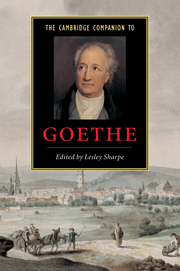Book contents
- Frontmatter
- Introduction
- 1 The world Goethe lived in
- 2 Goethe the writer and literary history
- 3 Goethe the poet
- 4 Goethe the dramatist
- 5 Faust
- 6 Weimar Classicism
- 7 Goethe and the Weimar theatre
- 8 Goethe’s prose fiction
- 9 Autobiographical writings
- 10 In defence of experience
- 11 Goethe and gender
- 12 Goethe and the visual arts
- 13 Goethe and the political world
- 14 Religion and philosophy
- 15 Reception in Germany and abroad
- A guide to further reading
- Index
8 - Goethe’s prose fiction
Published online by Cambridge University Press: 28 May 2006
- Frontmatter
- Introduction
- 1 The world Goethe lived in
- 2 Goethe the writer and literary history
- 3 Goethe the poet
- 4 Goethe the dramatist
- 5 Faust
- 6 Weimar Classicism
- 7 Goethe and the Weimar theatre
- 8 Goethe’s prose fiction
- 9 Autobiographical writings
- 10 In defence of experience
- 11 Goethe and gender
- 12 Goethe and the visual arts
- 13 Goethe and the political world
- 14 Religion and philosophy
- 15 Reception in Germany and abroad
- A guide to further reading
- Index
Summary
In many ways Goethe does not strike one as a born storyteller. There is little in his prose fiction of that teeming materiality we have come to expect from the great European novelists of the eighteenth and nineteenth centuries. Yet the narrative mode evidently meant a great deal to him because he wrote prose fiction throughout his long creative life. And he was a remarkably sophisticated witness to the emergence of the various forms of modern narrativity, particularly the novel.
Admittedly the tradition of German novel writing of the late eighteenth and nineteenth centuries which he helps to inaugurate does not figure in the pantheon of established European ‘classics’. Within the broad compass of narrative realism, with its wholehearted acknowledgement of the omnipresence of social life, German fiction tends to figure as at best a marginal presence. But all the same it has valuable insights to offer; most particularly, German writing of this period sustains and is sustained by an urgent dimension of reflectivity, one which invests the narrative process with an unmistakable intensity of theoretical self-commentary. Three of Goethe’s theoretical comments on fiction can serve to focus the particular contribution he makes to this tradition.
- Type
- Chapter
- Information
- The Cambridge Companion to Goethe , pp. 129 - 146Publisher: Cambridge University PressPrint publication year: 2002

